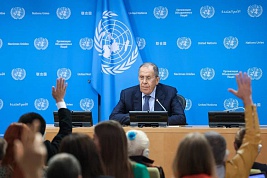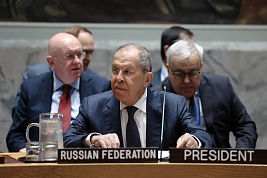Russian MFA Spokesman Andrei Nesterenko Interview to RIA Novosti on the Upcoming Visit to Moscow of German Vice Chancellor and Foreign Minister Guido Westerwelle
Question: FRG Vice Chancellor and Foreign Minister Guido Westerwelle is visiting Moscow this week. What does the Russian side expect from this visit?
Answer: The working visit of FRG Vice Chancellor and Foreign Minister Guido Westerwelle to Russia will take place on November 20.
Let me remind you that under the guidance of Westerwelle the Free Democratic Party garnered 14.6% of the vote in the recent elections, achieving the best result in its history.
Russia remembers that the FDP as part of different FRG coalition governments in 1969-1998 stood at the origins of the famous Ostpolitik, which laid the basis for good-neighborly relations between our two countries and played at the stage of Germany's unification a significant role in creating the foundation for their further onward development as a strategic partnership. During the years in opposition the German liberals shared the constructive political course of Berlin towards Russia.
With this in mind, we expect that the FDP in the spirit of continuity will promote the realization of the course towards cooperation and collaboration with Russia. We took note of the fact that the Russian sections of the coalition agreement between the CDU/CSU and FDP confirm the new German government's commitment to the concept formulated under the previous Cabinet, of developing Russian-German relations in the format "partnership for modernization."
Question: What issues are going to be discussed in the upcoming talks between the Ministers of Foreign Affairs of Russia and the FRG?
Answer: The main emphasis in the talks of Sergey Lavrov with his new German counterpart will be placed on a review of the current state of and prospects for Russian-German relations and on the fundamental importance of such well-proven basic principles of their construction as equality, respect, and consideration for mutual interests. We believe that we are reciprocally interested in further deepening the bilateral partnership, which is a positive factor in European politics and global affairs. The Ministers are also to discuss and outline a schedule of Russian-German political contacts for the near term.
I would like to point out that the favorable background created by the Russian President's speech at Berlin's Brandenburg Gate on 9 November 2009 at the celebration of the 20th anniversary of the fall of the Berlin Wall contributes to the unfolding of a systemic dialogue with the new government of the FRG. A confirmation of this is, above all, the fact that its key points on the decisive role of our country in Germany's unification, the destruction of the Iron Curtain, the end of ideological confrontation, and the launching of the process of democratic reconstruction in Europe have duly resounded and been positively received in the FRG and the world as a whole.
We are convinced that, given the incompleteness of the unifying processes on the continent, the importance grows of the Russian-German rapprochement and partnership as a driving factor and a guiding reference point for definitively overcoming the persistent old dividing lines, and those again being erected in the path of the construction of a system of a truly equal and indivisible security in the Euro-Atlantic area.
Question: How do you assess the prospects for expanding our cooperation with the FRG on the international scene?
Answer: In our opinion, there is substantial potential for increased collaboration with the FRG on key topical international problems. We regard Germany as a partner in the promotion of the initiative put forth by Dmitry Medvedev in Berlin on June 5, 2008 for concluding a European Security Treaty and in efforts to reset Russia-NATO relations and to develop Russia-European Union cooperation based on mutual benefit and consideration of interests. Another priority in security cooperation with the FRG is the issues of nuclear and conventional disarmament, arms control, the maintenance of strategic stability based on the balance and interrelationship of offensive and defensive arms, and the streamlining of the system of transparency and confidence building measures in the military sphere with regard for the constructive disposition of the partners to achieve progress in these areas. Traditionally, the focus of mutual attention are such issue clusters as strengthening the WMD nonproliferation regime, including the resolution of Iran's nuclear problem by politico-diplomatic means, as well as the situation in the Middle East, Afghanistan, and other hot spots and zones of instability.
The Russian side is interested in the continuation of joint work with the FRG to move forward with the G20 proposals to reform the international financial system and to coordinate steps to overcome the effects of the global economic crisis.
With this in mind, we intend to take stock of the sphere of intersecting interests of Russia and Germany by way of comparing notes.
Question: What can you say about the development of bilateral cooperation with Germany in the trade and economic sphere?
Answer: Moscow favors deepening with regard to the market situation bilateral cooperation in the economy and mutual investments sphere, bearing in particular in mind to maintain the positive trend of extensive Russian-German foreign economic relations and investment cooperation. Despite the crisis-triggered drop in Russian-German trade (about 50% from a record high in 2008 at 68.2 billion dollars), Germany has retained its status as one of Russia's principal trade partners, and now holds the second position after China in this regard.
In this context the upcoming talks of the foreign ministers of the two countries will focus on the realization of economic and investment projects. Notable among these is the Nord Stream gas pipeline project, which has received building permits from Denmark, Sweden and Finland.
Question: Are there any plans for joint commemorative events to mark the upcoming memorable dates in the history of Russian-German relations?
Answer: Taking into account the 65th anniversary of the Victory and the defeat of Nazism and the 20th anniversary of Germany's unification to be marked in 2010, as well as other round-figure dates in common history, the two sides will continue the work on organizing a set of joint social, political and cultural activities and memorial exhibition events oriented to counter the attempts at rewriting the recent history of Europe and to advance the course towards the rapprochement and historical reconciliation of the Russians and Germans. This calls for making full use of the relevant potential of the Petersburg Dialogue Public Forum, the Bilateral Commission of Historians, the Russian-German Museum Berlin-Karlshorst, and other specialized mechanisms in the cultural and humanitarian sphere.
November 18, 2009


